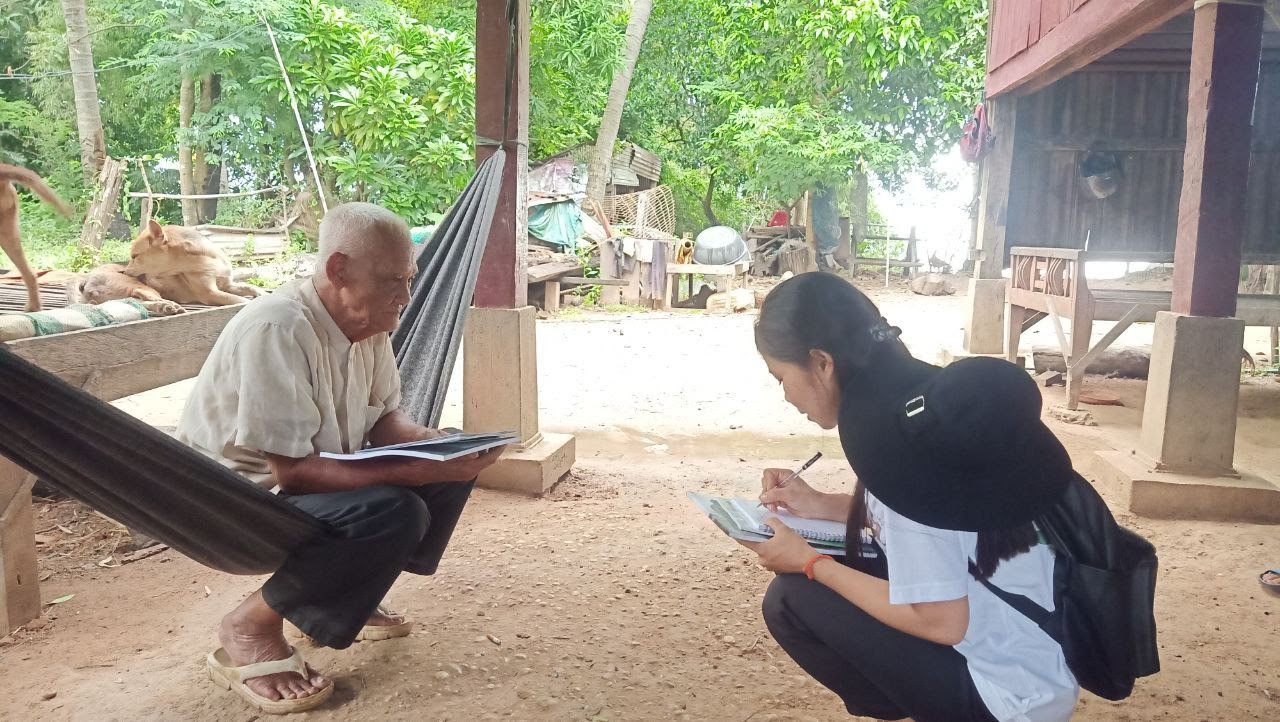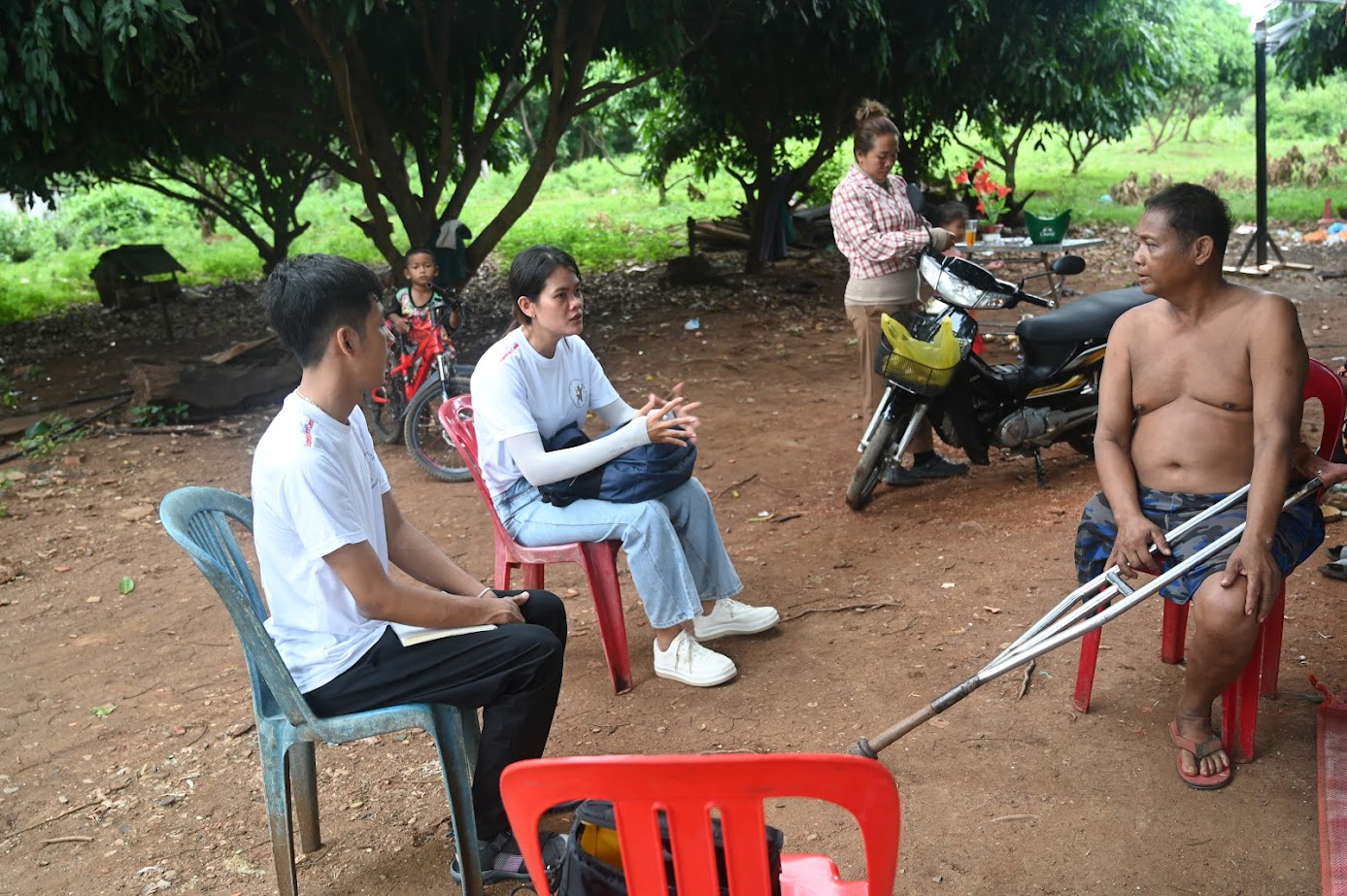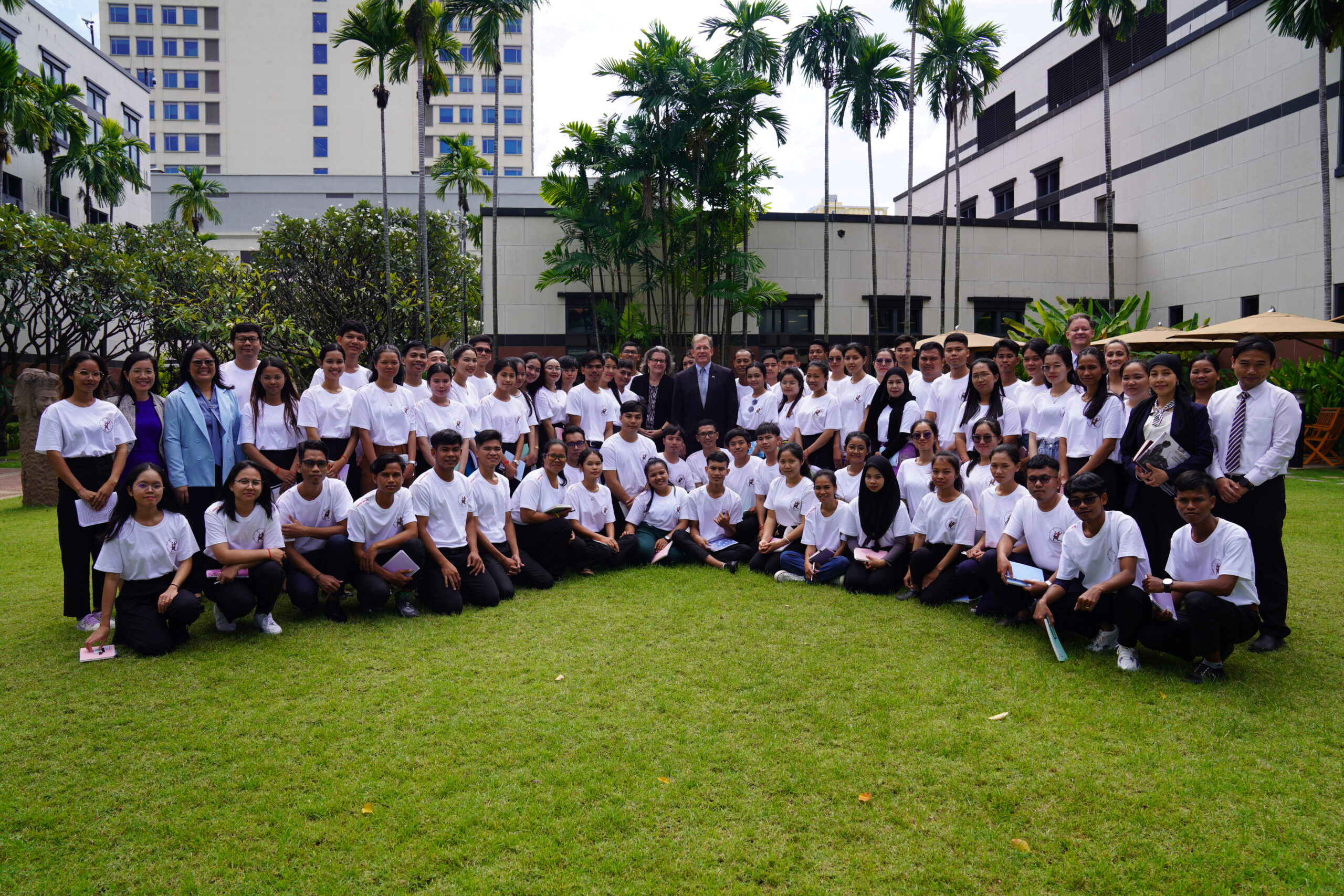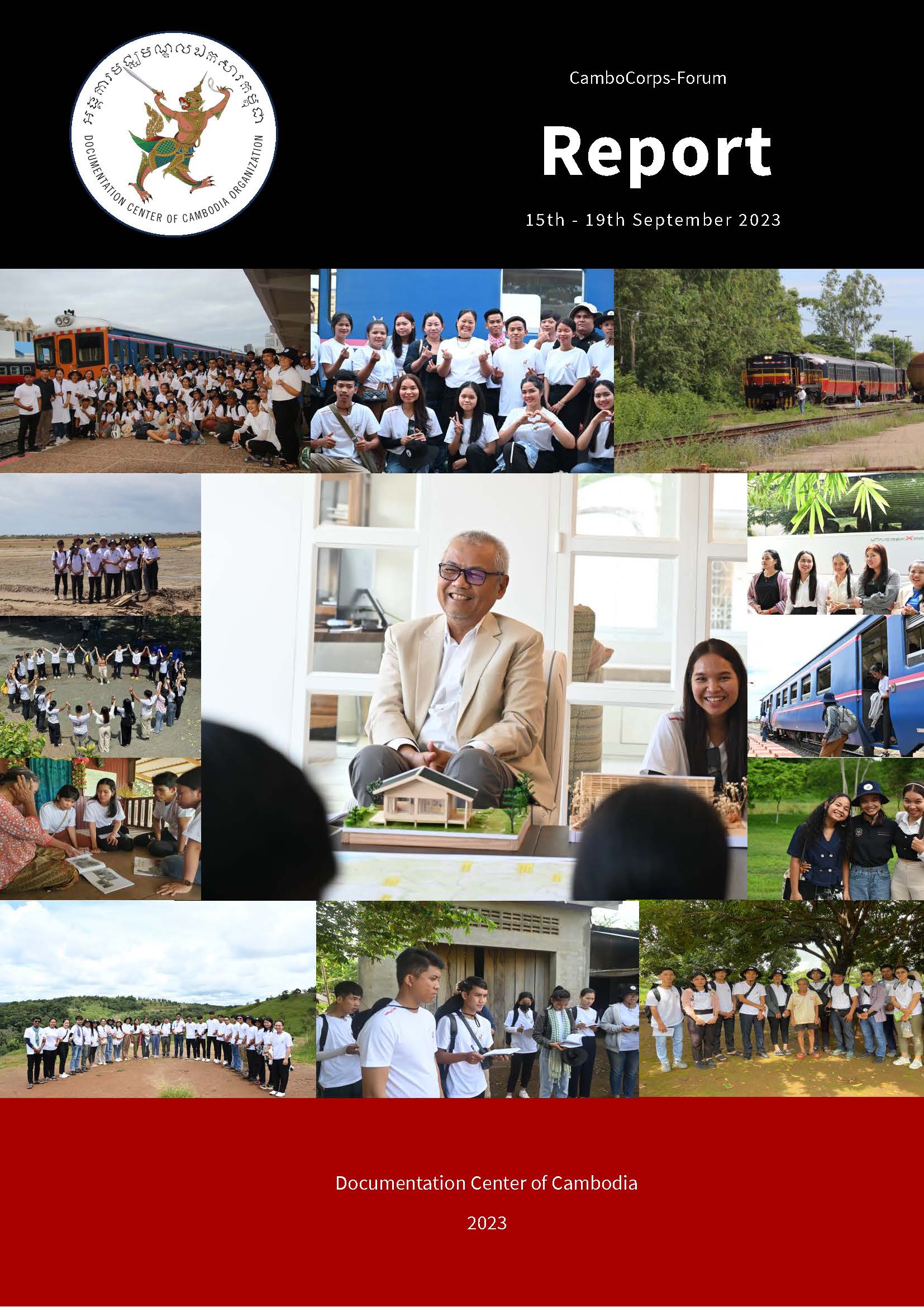Executive Summary
For over two decades, The Documentation Center of Cambodia (DC-Cam) has been surveying the survivors of the Khmer Rouge regime to develop a better understanding of survivor needs, interests and perspectives. Thanks to a generous grant from the United States Agency for International Development (USAID) in the summer of 2021, DC-Cam has been able to significantly expand its efforts in this area, particularly as it relates to developing a better understanding of the health and welfare conditions of survivors and establishing its volunteer youth leadership corps dedicated to this endeavor—CamboCorps—which is inspired from the United States AmeriCorps. As of August 2022, DC-Cam has collected information from over 31,000 Khmer Rouge survivors, and the following reflects observations and analysis of this work.
DC-Cam is also inspired by the “Pentagonal Strategy” of the new Cambodian Prime Minister Samdech Moha Borvor Thipadei Hun Manet and the public health strategy of recently appointed Cambodian Minister of Health, the Honorable, Chheang Ra. Prime Minister Manet’s Pentagonal Strategy outlines five guarantees that are laid out across six priority policy programmes. The first part of the Pentagonal Strategy is human capital development, which focuses on education, technical skills, health, social protection, food system and equity based on the spirit of “leaving no Cambodian citizen behind.” DC-Cam sees the Pentagonal Strategy as a prudent and extremely important step forward in balancing Cambodia’s rapid development with an equally important prioritization of the people at the grassroots level, who are the heart and soul of Cambodia. The first policy programme also involves the expansion of healthcare services towards the goal of providing universal health coverage. DC-Cam endorses this policy initiative (among others presented) because healthcare is one of the greatest priorities and needs of Cambodia’s “Greatest Generation”—the survivors of the Khmer Rouge era.1
The health dimensions of the Pentagonal Strategy and the six priority policy programmes inform the vision of the Honorable Chheang Ra, Cambodian Minister of Health, who is committed to improving the ethics of doctors in Cambodia and earning the public’s trust in Cambodia’s public and private health services. Minister Ra has encouraged doctors to improve their communication with local people and support the modernization of public health services, including the regulation of private health services. Together, Prime Minister Manet’s strategy and set of policy programmes and Minister Ra’s vision for a modernized Cambodian health system are expected to improve the quality of lives of Cambodians today and for generations to come. DC-Cam looks forward to supporting these national-level objectives through research, education, and direct action programmes.
Perhaps unsurprisingly, DC-Cam has found most Khmer Rouge survivors who took part in its survey cited financial circumstances to be the primary reason for not seeking treatment for mental or physical health conditions, disabilities, or ailments. DC-Cam also found that among the physical or mental health conditions reported by survivors, hypertension, and gastrointestinal disorders, followed by malaria, mental illness, and heart disease, were, in this order, the most important health concerns and debilitating conditions for survivors. While DC-Cam has more work to do in developing an understanding of these issues, it is notable that these conditions also coincide with survivors’ reported mental health conditions and concerns from their experiences under the Khmer Rouge regime. Eighty-seven percent of survivors who were surveyed by DC-Cam reported having troubling memories of the Khmer Rouge period that resonated with them to-date, and 25 percent of respondents reported still suffering nightmares of this period, even though these experiences occurred over forty years ago.
Finally, DC-Cam found that medication, as opposed to visits to a public or private healthcare provider or hospital, is the primary method used for treatment in lingering or unexpected medical care needs. Survivors’ reliance on medicine to meet medical care needs may indicate that, rather than financial resources alone, one’s access to care may also be greatly influenced by other overlapping geographic or socio-organizational conditions of accessibility.
Access can be conceptualized in different ways—from the distribution of medical services, resources, and facilities to the external characteristics of a population, such as in insurance coverage, attitudes to medical care, and income. It is possible that improving access, and consequently improving the health and welfare of survivors of atrocity crimes, may be less a matter of addressing the financial circumstances of survivors, and more a question about how to make medical care more convenient, trusted, and reliable.
DC-Cam’s research in this area is ongoing because DC-Cam continues to receive new survey and observational data under this project. For these reasons, these findings remain preliminary in nature; however, they raise many questions and implications that bear significant relevance for ongoing and potential future work with the survivor community in Cambodia and in other post-conflict countries.
Many survivors will pass away in the next five to ten years as many reach 70 years old or older. Because the life expectancy of Cambodians in general is approximately 70 years of age, unless we continue to dedicate resources and attention to collecting the oral history of this generation of survivors, we risk losing pieces of this history forever.
As DC-Cam continues its work in this area, we look forward to sharing our findings and recommendations with the public, not only to shine light on the plight, challenges, and barriers of access to essential health and social services for the survivors of the Khmer Rouge, but also where improvements can be made in the international community’s conceptualization of justice for survivors of atrocity crimes in all post-conflict societies around the world.
Key findings
1) Cambodian survivors predominantly identify as poor, unemployed or employed in occupations of relatively low wages (particularly agriculture).2
2) Women represented a higher percentage of the respondents across all age groups.3
3) Cambodian survivors predominantly attributed any illness, disease, or ailment they are suffering to old age.4
4) Survivor communities appear to be concentrated in the Tonle Sap Lake and Plains regions of Cambodia.5
5) Hypertension, gastrointestinal disorders, and mental illness stood out as the most reported, potential health conditions that could have been directly or indirectly associated with life under the Khmer Rouge regime.6
6) A notable percentage of survivors (at least 1 out of 4 respondents in this study) are reported to still suffer from some type of mental health condition or symptom that can be attributed to experiences under the Khmer Rouge.7
7) Medication, as opposed to visits to a public or private healthcare provider or hospital, is the primary method used for treatment by survivors in lingering or unexpected medical care needs.8
8) The majority of survivors received a COVID-19 vaccination; however, the fact that the older the generation of survivors, the reduced likelihood they received a vaccine raises an untested hypothesis that the older the generation the greater the challenge in providing new information, medicine or treatment.9
Recommendations
1) Actions, policies, or programmes aimed at addressing or offsetting the cost of medical care for survivors should be explored for purposes of improving survivors’ access to medical care.10
2) Actions, policies, or programmes aimed at addressing or supporting the support networks of survivors will also improve survivors’ access to care for survivors, particularly in remote and/or marginalized populations.11
3) Because women represented a higher percentage of the respondents across all age groups, there may be a potential need for greater attention to sex- and gender-sensitive care, resources, and support services for survivors.12
4) There is a need for greater attention to information, services, and resources that support healthy behaviors and routines among survivors.13
5) Future direct action or research programmes targeting survivor communities can target the Tonle Sap Lake and Plains regions of Cambodia; although, other areas of Cambodia, such as the Anlong Veng region, present possibilities for further research.14
6) There is a need for greater attention to information, services, and resources that support mental health among survivors and their families.1
Advancing the Rights and Improving the Conditions of the Health of Khmer Rouge Survivors
Forced Transfer March 28th, 2024-April 8th, 2024

On September 21, 2023, the United States Government (USG) marked the 30th anniversary of U.S. AmeriCorps, the U.S. federal agency for national service and volunteerism. Created by U.S. President Bill Clinton in 1993, the agency provides career pathways for Americans across the United States as they serve their communities. Their involvement may consist of addressing climate change, mentoring students, preserving native languages, supporting veterans as they transition from military to civilian life, or helping justice-involved adults re-integrate society.
A Note of Cultural Diplomacy Forum November 16th-17th, 2023
EXECUTIVE SUMMARY
The Documentation Center of Cambodia (DC-Cam)/Queen Mother Library is proud and honored to announce the “Cultural Diplomacy Forum” for 2023.
The Cultural Diplomacy Forum for 2023 is a 2-day seminar bringing together experts in the fields of Cambodian and international diplomacy, leadership, culture, and history to support the professional development of a selected group of Cambodian youth who have been responsive to the call to public service for the Cambodian People. Seventy-five (75) Cambodian youth have been selected out of a total of 1,500 Cambodian youth who have been responsive to serve with DC-Cam’s youth volunteer program, CamboCorps. Awardees were selected based on their meritorious volunteer service in CamboCorps and a demonstrated interest in future public service leadership in Cambodia and the world.
Documentation Center of Cambodia
DC-Cam was originally established by Yale University’s Cambodia Genocide Program in 1995, pursuant to the U.S. Cambodian Genocide Justice Act of 1994. Since 1997, the DC-Cam has operated as an independent civil society organization in Cambodia. The Center is the world’s largest archive of historical material on the genocide committed by the Khmer Rouge regime, and it has supported the work of the Extraordinary Chambers in the Courts of Cambodia (ECCC) (a U.N.-Cambodian court) in the prosecution of those most responsible for genocide, war crimes, and crimes against humanity committed between 1975 and 1979. The Center is an independent, not-for-profit, non-governmental organization that is acknowledged as a nonpartisan educational institute in Cambodia. DC-Cam’s two main objectives –memory and justice – serve to build the foundation for the rule of law and Cambodia’s national reconciliation.
Some photos and videos on DC-Cam’s CamboCorps.
Activities photos
DC-Cam CamboCorps Forum: Cultural Diplomacy 101. Meeting with U.S. Ambassador, Patrick W. Murphy
CamboCorps Forum Report September 15th - 19th, 2023
EXECUTIVE SUMMARY
On September 21, 2023, the United States Government (USG) recognized the 30th anniversary of U.S. AmeriCorps, the U.S. federal agency for national service and volunteerism. The agency, created by President Clinton in 1993, provides career pathways for Americans across the United States all while they serve their communities – addressing climate change, mentoring students, preserving native languages, supporting veterans as they transition from military to civilian life, and helping justice-involved adults re-enter society, to name a few examples.
Inspired by the vision, ideas, and impact of the USG’s AmeriCorps, the Documentation Center of Cambodia (DC-Cam) created CamboCorps, which aspires to generate the same spirit of national service and volunteerism for the youth of Cambodia. In 2021, DC-Cam established CamboCorps to connect aspiring young Cambodians with survivors of the Khmer Rouge for purposes of learning from survivors, supporting them in access to health care and services, and building an intergenerational dialogue that contributes to the preservation of Cambodia’s history.
This is the first gathering of our young CamboCorps volunteers who have been supporting our project Advancing the Rights and Improving the Conditions of the Health of the Khmer Rouge Survivors. For this forum, DC-Cam planned to have at least 200 students across the country join this forum where they would travel to 6 different locations to learn leadership skills and the history of the Khmer Rouge period as experienced by survivors. DC-Cam divided up the volunteers into two cohorts. The first cohort of volunteers traveled across Kampot, Pailin, and Pursat-Buntheay Meanchey for their forum. The second cohort of volunteers traveled across Stung Treng, Ratanakiri and Mondulkiri.
Based on their cohort, volunteers visited rural communities in these provinces that they never visited before to listen to the stories of survivors. It was an inspirational experience that allowed our volunteers to observe and acknowledge the geography, culture, diversity, and the history of Cambodia. For the group that traveled to Kampot, CamboCorps visited five different places such as Bak Nim village, Sre Ambel (Salt Field), Mlech Dam, Kampong Kraeng, and a durian farm at Kaun Sat Village, Teuk Chhou District in Kampot province. Each group of volunteers visited villages in other provinces, based on their assigned cohort.
For Kampot, Pailin, and Pursat-Buntheay Meanchey, our CamboCorps traveled by trains and buses whereas for volunteers in Stung Treng, Ratanakiri and Mondulkiri, they traveled by buses. For those travelling by train, we wanted them to reflect on the Khmer Rouge’s forced transfer of people in 1977. Those travelling by bus to northeastern parts of Cambodia would experience how life is like for ethnic minorities and the hill tribe groups-learning about the experience of survivors in these remote areas. Regardless of mode of transportation, all CamboCorps volunteers received important information on the history of genocide and atrocity crimes committed by the Khmer Rouge against ethnic minority groups, especially the Cham and the Vietnamese.
In future sessions, DC-Cam looks forward to expanding and refining the training, focusing on different attributes and dimensions of leadership, civic service, and more specialized training in skills that will empower the leaders of the future.
Some photos and videos on DC-Cam’s CamboCorps.
Activities photos
- Group 1 By Train And Bus: Genocide And Human Rights Study Tour For Cambocorps
- Group 1: Photography and Caption
- Group 2 By Train And Bus: Genocide And Human Rights Study Tour For Cambocorps To Pailin Province
- Group 2 By Train And Bus: Genocide And Human Rights Study Tour For Cambocorps To Pailin Province
- Group 2: Interview and Survivor’ Stories
- Group 3: Interview and Survivors’ Stories: Moul Ham: Where Did You Take My Parents?
- Group 4 By Bus: Genocide And Human Rights Study Tour For Cambocorps To Stung Treng Province
- Group 5 By Bus: Cambocorps To Ratanakiri Province
- Group 5: Book Reading and Summary: Kong Chanthy
- Group 6 By Bus: Cambocorps To Mondulkiri Province
- The Crocodile Star, 1975
Videos links
- Human Rights Study Tour For Dc-cam Volunteers Known As ‘Cambocorps
- Genocide And Human Rights Study Tour For DC-Cam Volunteer Known As ‘CamboCorps
- Genocide And Human Rights Study Tour For DC-Cam Volunteer Known As ‘CamboCorps
- DC-Cam Volunteer, Khin Sinay From Mondulkiri Province
- Genocide And Human Rights Study Tour For DC-Cam Volunteer Known As ‘CamboCorps
- Genocide And Human Rights Study Tour For DC-Cam Volunteer Known As ‘CamboCorps
- DC-Cam Interview with Khmer Rouge Survivor
- CamboCorps Study Tour to Mondulkiri
- Chum Chuon’s Story In Pailin Province
- Story of Leang Saren by Eng Sokmeng, DNews
- Story of Heng Cheangly by Eng Sokmeng, DNews
- Story of Bi Soen by Eng Sokmeng, DNews
- Bet Yin, Volunteer From Ratanakiri Province
- Chan Reth, Survivor From Pailin Province
- Mao Rin: I Lied My Story From Khmer Rouge
Activities Photos and Report
- Meeting with young researchers who joint the KHMER ROUGE RAILWAYS: Genocide and Democracy Study Tour For the Youth. The Forced Transfer, The Third Evacuation of People During The Khmer Rouge Regime (1975-1979). June 5, 2024
- KHMER ROUGE RAILWAYS: Genocide and Democracy Study Tour For the Youth. The Forced Transfer, The Third Evacuation of People During The Khmer Rouge Regime (1975-1979). June 4, 2024
- KHMER ROUGE RAILWAYS: Genocide and Democracy Study Tour For the Youth. The Forced Transfer, The Third Evacuation of People During The Khmer Rouge Regime (1975-1979), June 3, 2024
- KHMER ROUGE RAILWAYS: Genocide and Democracy Study Tour For the Youth. The Forced Transfer, The Third Evacuation of People During The Khmer Rouge Regime (1975-1979), June 2, 2024
- KHMER ROUGE RAILWAYS: Genocide & Democracy Study Tour For the Youth. The Forced Transfer, The Second Evacuation of People During The Khmer Rouge Regime (1975-1979). CamboCorps –Railway track, Group 8. Led by Koh Thma Documentation Ceter.The CamboCorps’s Comments, April 08-12, 2024
- KHMER ROUGE RAILWAYS: Genocide & Democracy Study Tour For the Youth. The Forced Transfer, The Second Evacuation of People During The Khmer Rouge Regime (1975-1979). Led by Koh Thma Documentation Center Team, CamboCorps –Railway track, Group 8. Meeting in Phnom Penh, April 12, 2024
- KHMER ROUGE RAILWAYS: Genocide & Democracy Study Tour For the Youth. The Forced Transfer, The Second Evacuation of People During The Khmer Rouge Regime (1975-1979). Led by Koh Thma Documentation Center Team, (CamboCorps –Railway track, Group 8). April 11, 2024
- KHMER ROUGE RAILWAYS: Genocide & Democracy Study Tour For the Youth. The Forced Transfer, The Second Evacuation of People During The Khmer Rouge Regime (1975-1979). Led by Veal Veng Reconciliation Team, CamboCorps –Railway track, Group 2. April 6, 2024
- KHMER ROUGE RAILWAYS: Genocide & Democracy Study Tour For the Youth. The Forced Transfer, The Second Evacuation of People During The Khmer Rouge Regime (1975-1979). Led by Veal Veng Reconciliation Team, CamboCorps –Railway track, Group 2. April 5, 2024
- CamboCorps, Group 8: Advancing The Rights And Improving The Health Conditions Of Khmer Rouge Survivors. Prey Veng Documentation Center, November 30, 2023
- Health Screening And Consultation: Takeo Documentation Center, November 13-15, 2023
- CamboCorps, Group 8: Advancing The Rights And Improving The Health Conditions Of Khmer Rouge Survivors. Prey Veng Documentation Center, October 30, 2023
- Forum On Health Education For Kr Survivors From Kamchay Mear District: Prey Veng Documentation Center, October 25, 2023
- Advancing The Rights And Improving The Health Conditions Of Kr Survivor: Cambocorp, Group 7, Prey Veng Documentation Center, October 6-7, 2023
- Prey Veng Documentation Center: Health Screening And Consultation, October 2-5, 2023
- CamboCorps, Group 8: Advancing The Rights And Improving The Health Conditions Of Khmer Rouge Survivors. Prey Veng Documentation Center, September 14, 2023
- Advancing The Rights And Improving The Health Conditions Of Khmer Rouge Survivor: Dc-cam’s Volunteer, Cambocorps, Group 8 (135 Volunteers). Takeo Documentation Center, September 8-11, 2023
- DC-Cam’s Health Message Development Forum: Photo1 | Photo2
- CamboCorps, Group 6: Advancing The Rights And Improving The Health Conditions Of Khmer Rouge Survivors. Prey Veng Documentation Center, August 9, 2023
- CamboCorps, Group 6: Advancing The Rights And Improving The Health Conditions Of Khmer Rouge Survivors. Prey Veng Documentation Center, July 12, 2023
- CamboCorps Volunteer Forum at Kampong Cham Documentation Center, July 09, 2023
- Interview With Khmer Rouge Survivors: Takeo Documentation Center – July 3, 2023
- Interview With Khmer Rouge Survivors: Takeo Documentation Center, June 18, 2023
- DC-Cam’s 100 CamboCorps Volunteers. Kampong Cham Documentation Center, June 16, 2023
- Takeo Documentation Center – Cambocorps Recruitment In Prey Kabbas District, June 14, 2023
- Interview With Khmer Rouge Survivors: Takeo Documentation Center, June 4, 2023
- CamboCorps, Group 6: Advancing The Rights And Improving The Health Conditions Of Khmer Rouge Survivors. Prey Veng Documentation Center, June 1, 2023
- Cambocorps, Group 6: Advancing The Rights And Improving The Health Conditions Of Khmer Survivors: Takeo Documentation Center, May 22, 2023
- Cambocorps, Group 6: Advancing The Rights And Improving The Health Conditions Of Khmer Rouge Survivors. Prey Veng Documentation Center, May 16, 2023
- Genocide Education & Research: Meeting With New Volunteer — Cambocorps, May 14, 2023
- DC-Cam’s Community Youths Outreach: CamboCorps Volunteers Meet Khmer Rouge Survivors in Koh Sotin district, May 10-13, 2023
- CamboCorps Volunteers Meet the Khmer Rouge Survivors, May 2023
- Genocide Awareness Month. Survivor Forum On Health Issue During Khmer Rouge Regime. Prey Veng Documentation Center On April 12, 2023
- Access to Health and Social Service for Khmer Rouge Survivors, Kampong Cham province, April 5, 2023
- DC-Cam Mental Health Training For Khmer Rouge Survivors In Tram Kak District: Takeo Documentation Center, March 28, 2023
- Khmer Rouge Survivors and Disabilities Forum. Prey Veng Documentation Center, March 27, 2023
- DC-Cam Mental Health Forum, the Khmer Rouge Survivors in Kampong Cham province, March 2023
- Mental Health Forum for the Khmer Rouge Survivors, Kampong Cham Documentation Center, March 16, 2023
- Khmer Rouge Survivors and Disabilities Forum – Takeo Province, February 21, 2023
- DC-Cam’s Takeo Documentation Center: A Research Project In Neuroscience In Cambodia By Prof. Emilie Caspar And Mr. Guillaume Pech From Ghent University, Belgium, January 26 – 28, 2023
2022
DC-Cam Meeting Khmer Rouge Survivor, Kampong Cham Province, September 2022
Health Message Developments Forum – Prey Veng Documentation Center, August 10, 2022
15 KR survivors from Tram Kak district attended the forum, August 2022
A Report From Takeo Documentation Center: Health Message Developments Forum, August 15 – 16, 2022
DC-Cam Health Message Development Forum, August 2022
Genocide Research And Education: Prey Veng Documentation Center: Memory Box For Khmer Rouge Survivors, May 11, 2022|Khmer Times
Takeo Documentation Center: Gift Boxes Delivery and Home Visit in February 15-24, 2022
CamboCorps Volunteers Batch 3, February 2022
CamboCorps Volunteers, January 2022
2021
DC-Cam’s Souvenir Boxes For Survivors Of The Khmer Rouge In Takeo Province, September 8 – 10, 2021
Takeo Documentation Center: The Discussion with Clinics and Genocide Survivors, September 2, 2021
DC-Cam’s Souvenir Boxes For Survivors Of The Khmer Rouge In Takeo Province, August 29 – 31, 2021
DCCAM’s Souvenir Box For Survivors Of The Khmer Rouge In Prey Veng Province, August 25, 2021





